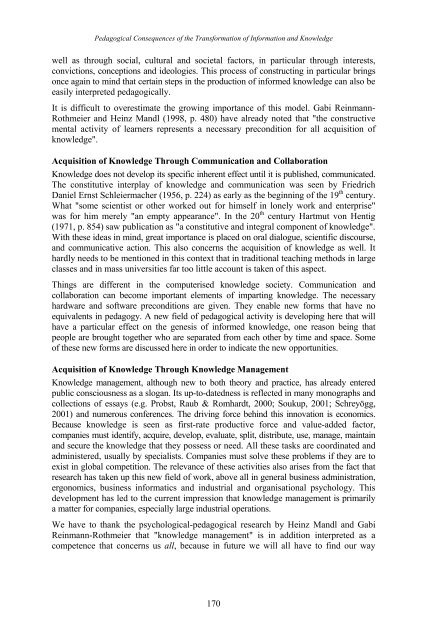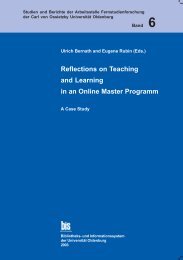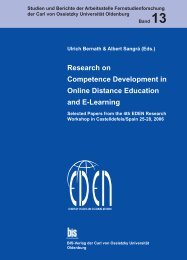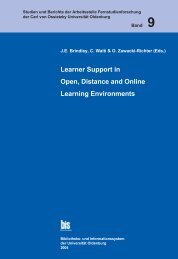Distance Education in Transition - Master of Distance Education ...
Distance Education in Transition - Master of Distance Education ...
Distance Education in Transition - Master of Distance Education ...
You also want an ePaper? Increase the reach of your titles
YUMPU automatically turns print PDFs into web optimized ePapers that Google loves.
Pedagogical Consequences <strong>of</strong> the Transformation <strong>of</strong> Information and Knowledge<br />
well as through social, cultural and societal factors, <strong>in</strong> particular through <strong>in</strong>terests,<br />
convictions, conceptions and ideologies. This process <strong>of</strong> construct<strong>in</strong>g <strong>in</strong> particular br<strong>in</strong>gs<br />
once aga<strong>in</strong> to m<strong>in</strong>d that certa<strong>in</strong> steps <strong>in</strong> the production <strong>of</strong> <strong>in</strong>formed knowledge can also be<br />
easily <strong>in</strong>terpreted pedagogically.<br />
It is difficult to overestimate the grow<strong>in</strong>g importance <strong>of</strong> this model. Gabi Re<strong>in</strong>mann-<br />
Rothmeier and He<strong>in</strong>z Mandl (1998, p. 480) have already noted that "the constructive<br />
mental activity <strong>of</strong> learners represents a necessary precondition for all acquisition <strong>of</strong><br />
knowledge".<br />
Acquisition <strong>of</strong> Knowledge Through Communication and Collaboration<br />
Knowledge does not develop its specific <strong>in</strong>herent effect until it is published, communicated.<br />
The constitutive <strong>in</strong>terplay <strong>of</strong> knowledge and communication was seen by Friedrich<br />
Daniel Ernst Schleiermacher (1956, p. 224) as early as the beg<strong>in</strong>n<strong>in</strong>g <strong>of</strong> the 19 th century.<br />
What "some scientist or other worked out for himself <strong>in</strong> lonely work and enterprise"<br />
was for him merely "an empty appearance". In the 20 th century Hartmut von Hentig<br />
(1971, p. 854) saw publication as "a constitutive and <strong>in</strong>tegral component <strong>of</strong> knowledge".<br />
With these ideas <strong>in</strong> m<strong>in</strong>d, great importance is placed on oral dialogue, scientific discourse,<br />
and communicative action. This also concerns the acquisition <strong>of</strong> knowledge as well. It<br />
hardly needs to be mentioned <strong>in</strong> this context that <strong>in</strong> traditional teach<strong>in</strong>g methods <strong>in</strong> large<br />
classes and <strong>in</strong> mass universities far too little account is taken <strong>of</strong> this aspect.<br />
Th<strong>in</strong>gs are different <strong>in</strong> the computerised knowledge society. Communication and<br />
collaboration can become important elements <strong>of</strong> impart<strong>in</strong>g knowledge. The necessary<br />
hardware and s<strong>of</strong>tware preconditions are given. They enable new forms that have no<br />
equivalents <strong>in</strong> pedagogy. A new field <strong>of</strong> pedagogical activity is develop<strong>in</strong>g here that will<br />
have a particular effect on the genesis <strong>of</strong> <strong>in</strong>formed knowledge, one reason be<strong>in</strong>g that<br />
people are brought together who are separated from each other by time and space. Some<br />
<strong>of</strong> these new forms are discussed here <strong>in</strong> order to <strong>in</strong>dicate the new opportunities.<br />
Acquisition <strong>of</strong> Knowledge Through Knowledge Management<br />
Knowledge management, although new to both theory and practice, has already entered<br />
public consciousness as a slogan. Its up-to-datedness is reflected <strong>in</strong> many monographs and<br />
collections <strong>of</strong> essays (e.g. Probst, Raub & Romhardt, 2000; Soukup, 2001; Schreyögg,<br />
2001) and numerous conferences. The driv<strong>in</strong>g force beh<strong>in</strong>d this <strong>in</strong>novation is economics.<br />
Because knowledge is seen as first-rate productive force and value-added factor,<br />
companies must identify, acquire, develop, evaluate, split, distribute, use, manage, ma<strong>in</strong>ta<strong>in</strong><br />
and secure the knowledge that they possess or need. All these tasks are coord<strong>in</strong>ated and<br />
adm<strong>in</strong>istered, usually by specialists. Companies must solve these problems if they are to<br />
exist <strong>in</strong> global competition. The relevance <strong>of</strong> these activities also arises from the fact that<br />
research has taken up this new field <strong>of</strong> work, above all <strong>in</strong> general bus<strong>in</strong>ess adm<strong>in</strong>istration,<br />
ergonomics, bus<strong>in</strong>ess <strong>in</strong>formatics and <strong>in</strong>dustrial and organisational psychology. This<br />
development has led to the current impression that knowledge management is primarily<br />
a matter for companies, especially large <strong>in</strong>dustrial operations.<br />
We have to thank the psychological-pedagogical research by He<strong>in</strong>z Mandl and Gabi<br />
Re<strong>in</strong>mann-Rothmeier that "knowledge management" is <strong>in</strong> addition <strong>in</strong>terpreted as a<br />
competence that concerns us all, because <strong>in</strong> future we will all have to f<strong>in</strong>d our way<br />
170





